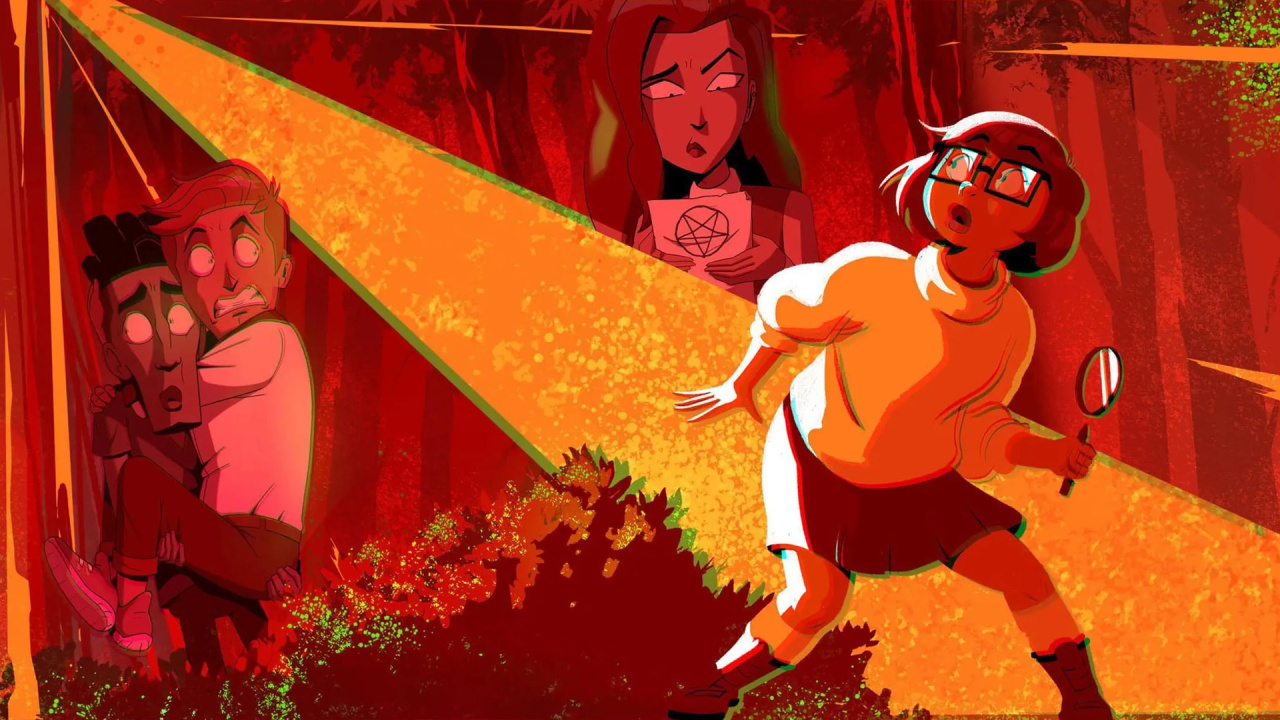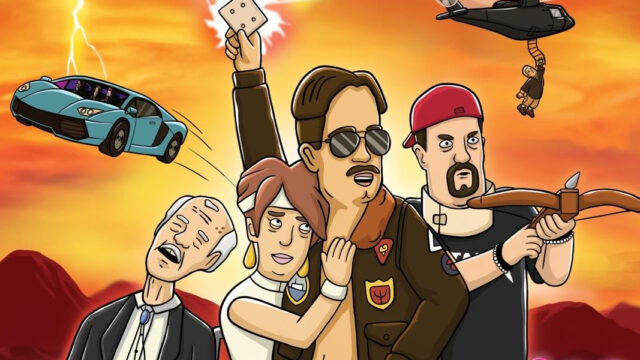Season Review: Velma Season Two
Overview:
After surviving the jinkied-up hijinks of a serial killer in Crystal Cove, Velma Dinkley and her mystery-chasing friends find themselves with an even greater challenge on their hands when another serial killer runs rampant in their humble hamlet. And this time the murderer has a penchant for removing a particular body part from their victims. Velma rallies the troops back together, but new internal struggles and personal problems prove that a serial killer and pesky poltergeists might be the least of their concerns. Crystal Cove’s preeminent mystery-solvers will need to swallow their pride, shed their egos, and embrace honesty before they can catch a killer.
Our Take:
Velma’s first season was not good television. It’s a series that’s emblematic of many of the larger problems that have plagued the television and film industries who are eager to trot out established IP rather than original stories. Granted, some modern reboots, legacy sequels, or prequel projects can actually tap into something unique and special, as long as there is passion and pure intentions present. Velma’s first season ruffled feathers in all the wrong ways as a radical, offensive, try-hard series that enraged more than it entertained. Velma’s second season is very much a mixed bag. It gets many of these poor impulses out of its system after a season of subpar storytelling, but it still struggles to relax and be itself when faced with the larger Scooby-Doo legacy.
Ironically, the identity crisis that Velma experiences in its second season parallels the one that Velma herself – and the entire cast – undergo in these new episodes. The series and its characters reckon with the last season’s events and how it’s helped them all improve. That being said, Velma’s second season still succumbs to many of the same mistakes and temptations, the likes of which are magnified to an even greater degree this time around. Velma’s second season is a modest improvement upon its first, yet it’s still likely to annoy and frustrate audiences – whether they’re Hanna-Barbera purists or simply people who are looking for a smart and well-plotted animated comedy.
Velma’s second season is a year where everyone is in search of finding themselves. Velma, Daphne, Fred, and Norville all set out to get to the core of who they really are, deep down. It’s a theme that becomes the season’s grander mantra. These episodes build tension through the fact that Velma is now suddenly popular, due to saving everyone’s lives, and how she copes with this newfound confidence and success without letting it go to her head. There’s also fresh relationship drama as she and Daphne experience growing pains after Velma’s awkward Freudian slip from last season’s finale.
There’s a lot of litigation over the existence of soulmates and manifesting one’s destiny that subsumes the entire season and raises some surface-level problems between this couple. It’s not anything that hasn’t already been explored in every other fractured TV relationship. This also results in a pretty half-baked Breakfast Club homage and a radical ‘50s science fiction farce that never fully comes together or feels natural, which is saying something in a season that dabbles in ghosts, witches, and androids.
The death of Fred’s mom last season also triggers major changes between Fred and Norville. This becomes a spicy rogue element to this season that further mixes things up and pushes the characters out of their comfort zones to strong effect. Fred, beyond a new appreciation for Jesus, also gains a van and a rudimentary mystery-hunting business. Velma slowly begins to connect the disparate dots between Velma and Scooby-Doo in a considerably more natural manner than the broad storytelling and character work of the first season.
Norville, haunted with PTSD over the murder of Fred’s mom, is another interesting new wrinkle to Velma’s second season. It’s easy to imagine how this major trauma pushes this version of Norville closer to his Scooby-Doo Shaggy counterpart. It’s immediately a more refreshing angle than anything that was done with him in season one. Velma’s mom also gets into a contentious new relationship that seriously irks Velma and causes further strife within her family so that she’s left with even fewer places to turn to for safety and reassurance. Strangely enough, it’s Fred who benefits the most from this new arrangement and he finds himself with a new and caring maternal figure in his life.
Velma’s cast experiences serious shifts this year, but there are also new players who properly stir up the series’ established dynamics. Amber, a spunky goth, proves to be a worthy foil to Velma who champions wiccan arts and spiritualism over physics. They’re effectively the Mulder to Velma’s Scully, which is actually a smart angle for this show to explore. Fred’s recently discovered faith and belief in a higher purpose also contributes to this larger debate between spiritualism and science. It’s a rather generic conflict to drudge up between Velma’s cast. However, it’s still an attempt at more layered storytelling and something deeper for the series.
Amber is the child of one of the Hex Girls, no less, which is actually a fun way to subvert classic Hanna-Barbera characters. This might induce some eye rolls, but it’s much fresher than any of the radical character changes that were made back in season one, which were seemingly just for the sake of being different, rather than actually thinking them through and arriving at a schism that feels logical. Velma also erases the bulk of this perfunctory character development by the season’s half-way mark, which leads to it feeling even more frivolous and incidental.
Alternatively, all of this also prompts a Wiccan phase in Daphne, which comes across as much more slap-dash and unearned than everyone else’s season two character shifts. Velma also really leans into the disembodied brain element where talking hunks of grey matter become actual characters. In fact, Lola’s brain becomes Norville’s greatest ally this season and their budding “will they won’t they” dynamic is oddly one of the most compelling relationships in Velma’s second season.
More outlandish threats take over the season – like spectral possession – and become a genuine concern for Velma and company. It pushes the series to take on a very Twin Peaks flavor, which isn’t the worst approach for Velma. Velma toes the line as to whether this is just a supernatural red herring. A choice this bold is at least interesting and does something different, regardless of whether it clashes with the original Scooby-Doo’s universe and its rules.
To that point, Velma’s second season also culminates in a bonkers incorporation of one of the Scooby-Doo franchise’s most controversial characters that attempts to realistically explain and justify an absurdist cartoon character. It’s a question that nobody else has seemed interested in asking or accounting for in 45 years of Scooby-Doo content. It’s a development that audiences will either love or loathe, depending on where their loyalties to the franchise lie. It might be the stupidest or most brilliant thing that the show has done. It’s a decision that feels authentically Velma in nature and the series deserves credit for going to this wild place. One could argue that the entirety of Velma was made to reach this gonzo conclusion.
Not everything in Velma’s second season is a miscalculation. The comedy may consistently fall flat, but there continues to be creative flourishes that properly take advantage of this animated medium. There’s a charming flashback that’s presented in a Max and Dave Fleischer animation style a la Betty Boop that has a little extra creative juice. Norville’s pervasive hallucinations also operate with an extra heightened quality that helps elevate them to something better that properly pushes Velma’s visuals to their limit, This remains Velma’s low-key secret weapon and strongest asset.
If nothing else, Velma’s second season absolutely goes for broke. This season ties up its loose ends and provides closure to its character arcs. However, there’s a truly wild ending that indicates that Velma still intends to continue with its story, despite how a third season has yet to be confirmed (and seems unlikely). That being said, this ending would surprisingly be more effective if it were written as Velma’s series finale and an ambitious, unexpected end note to go out on. Velma proves to be a marginal improvement in its second season as it bridges the gap between Velma and Scooby-Doo. That being said, it’s still an unnecessary and derivative case of nihilistically churning out old IP to hollow effect. All the “Puppy Power” in the world can’t save Velma from empty writing and cliché characters.
‘Velma’ premieres April 25th on HBO Max



























I hope it's not Crunchyroll; if they really cared about the franchise much, Volume 10 would have already been announced a long time ago.